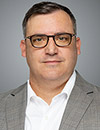Crossover sensing and autonomy technologies are pushing satellite systems toward lower-cost, smaller, distributed architectures with shortened cycles in all areas: design, build, launch, operation, and decommission. Moreover, emerging topics in sensor data processing and communications such as artificial intelligence and machine learning; optical crosslinks; and 5G are providing unprecedented data analysis and satellite connectivity with reduced latency. As a result, proliferated small satellite low-earth orbit constellations with space-based processing for earth observation and geospatial information in the commercial, civil, and defense space sectors are booming. These innovation trends present both opportunities and challenges in sensor processing, hardware, advanced manufacturing, supply chain, sustainability, domain awareness, governance, and workforce development. Join our illustrious panelists and moderator as we discuss emerging topics, needs, and crossover technology at this symposium-wide panel.
Moderator
 |
| |
| |
David Ellis
Director of Strategic Development
BAE Systems Inc., Space & Mission Systems (United States) |
|
|
David Ellis leads strategic capabilities development and planning around technology positioning for future needs within BAE's Military Space business area, as well as certain sector strategic operations functions. This includes advanced technology development; U.S. Intelligence Community and Department of Defense funded research and development (R&D); critical internal R&D projects; and external technology partnerships. He is chair of the Space & Mission Systems technology council and leads the sector's cross-collaboration with other sector technology groups. Dr. Ellis brings over 20 years experience in electronics systems and aerospace, previously leading payload engineering advanced technology development and national space strategic business development within other areas of BAE. He has also developed advanced communications systems for Qualcomm Government and worked for Northrop Grumman Electronics Systems. He holds a BS and MS in electrical engineering, a ME in engineering management, and a Doctorate in strategic leadership.
Panelists
 |
| |
| |
Gabe Mounce
Space Force Accelerators
Air Force Research Laboratory (United States) |
|
|
Gabe Mounce is the Director of the Tech Engagement Office for the Air Force Research Lab (AFRL) in New Mexico where he oversees technology transfer & commercialization, community engagement and outreach for the lab's Space and Directed Energy technology areas. In this role, he oversees commercial engagement programs for the Space Vehicles and Directed Energy elements of AFRL consisting of the Hyperspace Challenge, Catalyst Space Accelerator, Q-Station Space Tech Cohort, and NewSpace Nexus Ignitor. He is a founder and Strategic Advisor to SpaceWERX, the U.S. Space Force's Innovation office focused on discovering and connecting commercial capability to the Space Force mission.
 |
| |
| |
Michael Foster
Chief Data Engineer
Raft (United States) |
|
|
Michael Foster serves as Chief Data Engineer at Raft, a company which specializes in operationalizing Public Sector data and agentic AI from the edge. Drawing from 25 years at the intersection of the U.S. tech industry, Department of Defense, and Intelligence Community, Dr. Foster has expertise in remote sensing analytics and complex data systems. His notable prior roles include Chief Data Officer for U.S. Central Command, solutions engineering lead for AI startup CrowdAI and Maxar, head of the National Geospatial-intelligence Agency's analytic modernization portfolio, and a payload acquisition lead at the National Reconnaissance Office. He earned a Physics BS and Remote Sensing PhD from the U.S. Air Force Academy and Rochester Institute of Technology, respectively.
 |
| |
| |
Kevin Flesher
Senior Director
Maxar Intelligence (United States) |
|
|
Kevin Flesher is Senior Director for Space ISR Solutions, Business Development & Strategic Growth, supporting international defense & intelligence and U.S. Government opportunities in Earth Intelligence. He has 42 years of experience in national security and remote sensing system development supporting government, commercial, and international customers. Previously, Kevin worked at Lockheed Martin Space Systems in strategy, market growth, and customer outreach for space and ground programs across intelligence and civil agencies. Kevin contributed to Space Imaging (now Maxar) from initial start-up to successful initial operations capability of the first EO remote sensing satellite and was later responsible for international operations of the network of ground stations. Kevin began as a systems engineer and manager at Northrup Grumman and Raytheon on numerous ground control; processing, exploitation, and dissemination; satellite communications; and remote sensing programs. Kevin holds a BS and MS in Electrical Engineering and a MS in Business Administration.
 |
| |
| |
Tarek A. Elgohary
Associate Professor
University of Central Florida (United States) |
|
|
Tarek Elgohary is an associate professor at the Mechanical and Aerospace Engineering Department at the University of Central Florida. Before that, he was a postdoctoral research associate at Texas A&M Aerospace Engineering. He received his BS in Mechanical Engineering from the American University in Cairo and his MS and PhD in Aerospace Engineering from Texas A&M University. His research interests are developing analytical & computational techniques for astrodynamics; space domain awareness; and space flight guidance, navigation, and control problems. His research has been funded by the U.S. Air Force Office of Scientific Research, Federal Aviation Administration, National Aeronautics and Space Administration, Lockheed Martin, and Space Force.
 |
| |
| |
Mark Keremedjiev
Mission Director
Planet Labs PBC (United States) |
|
|
Mark Keremedjiev is the Mission Director for Tanager at Planet Labs PBC. In this capacity he oversees space, ground, pipeline, data platform, product, and commercial operations for the hyperspectral mission. Mark got his PhD in astrophysics at the University of Florida studying supermassive black holes and building observing instruments. He then spent over a decade in the U.S. federal government managing a range of programs from software to satellites.
Event Details
FORMAT: General session with live audience Q&A to follow each presentation.
MENU: Coffee, decaf, and tea will be available outside the presentation room.
SETUP: Theater style seating. .






